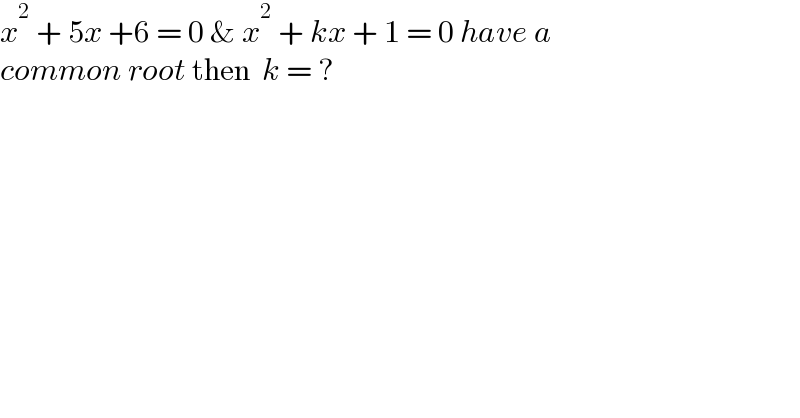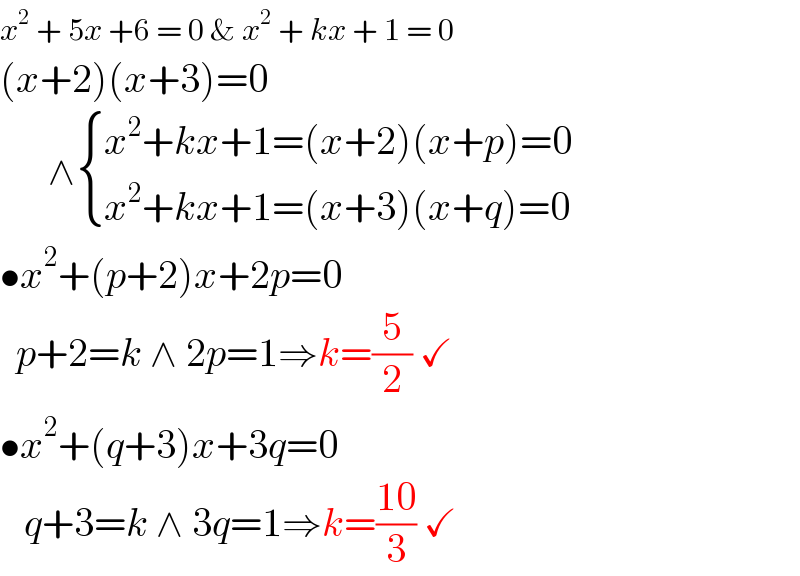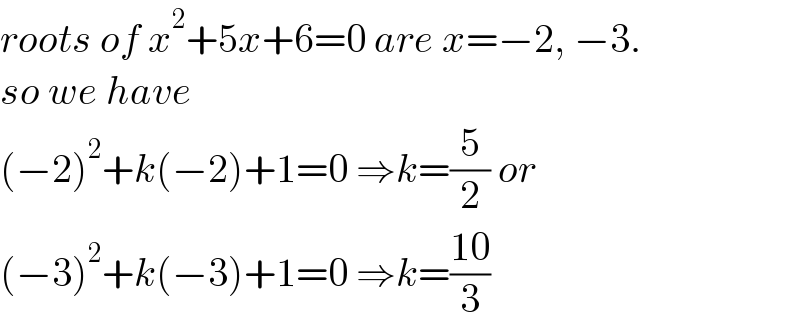
Question Number 205021 by BaliramKumar last updated on 06/Mar/24

$${x}^{\mathrm{2}} \:+\:\mathrm{5}{x}\:+\mathrm{6}\:=\:\mathrm{0}\:\&\:{x}^{\mathrm{2}} \:+\:{kx}\:+\:\mathrm{1}\:=\:\mathrm{0}\:{have}\:{a}\: \\ $$$${common}\:{root}\:\mathrm{then}\:\:{k}\:=\:? \\ $$
Answered by Rasheed.Sindhi last updated on 06/Mar/24

$${x}^{\mathrm{2}} \:+\:\mathrm{5}{x}\:+\mathrm{6}\:=\:\mathrm{0}\:\&\:{x}^{\mathrm{2}} \:+\:{kx}\:+\:\mathrm{1}\:=\:\mathrm{0} \\ $$$$\left({x}+\mathrm{2}\right)\left({x}+\mathrm{3}\right)=\mathrm{0}\: \\ $$$$\:\:\:\:\:\:\wedge\begin{cases}{{x}^{\mathrm{2}} +{kx}+\mathrm{1}=\left({x}+\mathrm{2}\right)\left({x}+{p}\right)=\mathrm{0}}\\{{x}^{\mathrm{2}} +{kx}+\mathrm{1}=\left({x}+\mathrm{3}\right)\left({x}+{q}\right)=\mathrm{0}}\end{cases}\: \\ $$$$\bullet{x}^{\mathrm{2}} +\left({p}+\mathrm{2}\right){x}+\mathrm{2}{p}=\mathrm{0} \\ $$$$\:\:{p}+\mathrm{2}={k}\:\wedge\:\mathrm{2}{p}=\mathrm{1}\Rightarrow{k}=\frac{\mathrm{5}}{\mathrm{2}}\:\checkmark \\ $$$$\bullet{x}^{\mathrm{2}} +\left({q}+\mathrm{3}\right){x}+\mathrm{3}{q}=\mathrm{0} \\ $$$$\:\:\:{q}+\mathrm{3}={k}\:\wedge\:\mathrm{3}{q}=\mathrm{1}\Rightarrow{k}=\frac{\mathrm{10}}{\mathrm{3}}\:\checkmark \\ $$
Commented by BaliramKumar last updated on 06/Mar/24

$$\mathrm{thanks} \\ $$
Answered by mr W last updated on 06/Mar/24

$${roots}\:{of}\:{x}^{\mathrm{2}} +\mathrm{5}{x}+\mathrm{6}=\mathrm{0}\:{are}\:{x}=−\mathrm{2},\:−\mathrm{3}. \\ $$$${so}\:{we}\:{have} \\ $$$$\left(−\mathrm{2}\right)^{\mathrm{2}} +{k}\left(−\mathrm{2}\right)+\mathrm{1}=\mathrm{0}\:\Rightarrow{k}=\frac{\mathrm{5}}{\mathrm{2}}\:{or} \\ $$$$\left(−\mathrm{3}\right)^{\mathrm{2}} +{k}\left(−\mathrm{3}\right)+\mathrm{1}=\mathrm{0}\:\Rightarrow{k}=\frac{\mathrm{10}}{\mathrm{3}} \\ $$
Commented by BaliramKumar last updated on 06/Mar/24

$$\mathrm{thanks} \\ $$
